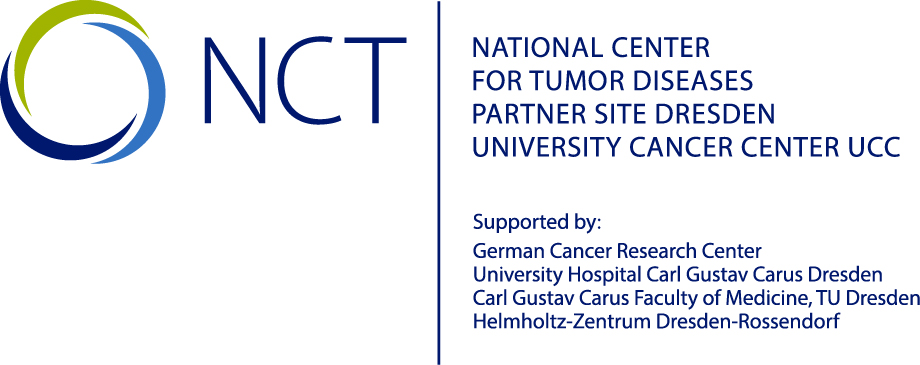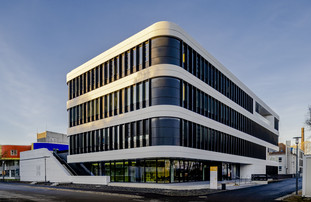The German Cancer Society has certified ten organ cancer centers at the National Center for Tumor Diseases Dresden (NCT/UCC). New are the centers for pediatric oncology, hematology, head and neck tumors and sarcomas. In addition, the Cancer Center at the University Hospital Carl Gustav Carus Dresden, which is also one of the nationwide 14 Oncological Centers of Excellence, was again certified as an Oncology Center. The extensive positive assessment by independent experts once again proves that treatment in the respective centers is carried out by experienced specialists according to the latest standards and guarantees patients a high level of treatment quality.
The National Center for Tumor Diseases Dresden (NCT/UCC) is a joint institution of the German Cancer Research Center (DKFZ), the University Hospital Carl Gustav Carus Dresden, Carl Gustav Carus Faculty of Medicine at TU Dresden and the Helmholtz-Zentrum Dresden-Rossendorf (HZDR).
With the certification of four additional organ cancer centers by the German Cancer Society, the National Center for Tumor Diseases Dresden (NCT/UCC) at the University Hospital Carl Gustav Carus Dresden underlines its broad expertise in the care of cancer patients at the highest level. "The comprehensive certification offers patients with different types of cancer access to high-quality specialized care. They can be sure that they will be treated at every stage of their disease by experienced specialists in the respective tumor disease and according to current therapeutic standards. We are pleased that the expert panel has certified ten organ cancer centers at the NCT/UCC for the first time," says Prof. Michael Albrecht, Medical Director of Dresden University Hospital. The newly added Organ Cancer Centers are the Centers for Pediatric Oncology, Hematology, Head and Neck Tumors and Sarcomas. The centers for visceral oncology - including the centers for intestinal, pancreatic, gastric, liver and esophageal cancer -, neuro-oncology, uro-oncology - with the associated centers for prostate and kidney cancer -, the skin tumor center, the gynecological cancer center and the regional breast center with sites at Dresden University Hospital, Josephstift Dresden, the Diakonissenkrankenhaus Dresden and the Elblandklinikum Radebeul. In addition, the NCT/UCC is home to one of the centers for Hereditary Breast and Ovarian Cancer, which has now also been certified by the German Cancer Society.
The Organ Cancer Centers are part of a three-stage certification model that is intended to ensure that patients with oncological diseases in Germany are cared for according to uniform high quality standards, from diagnosis through therapy to aftercare. It was developed by the German Cancer Society and the German Cancer Aid. Within the three-stage model, the organ cancer centers form the broad base - they currently exist at 991 locations throughout Germany - offering the most comprehensive high-quality care possible, especially for common tumor diseases. On the second level come the oncology centers, which bundle expertise for several diseases, including rare ones.
What all centers have in common is that outpatient and inpatient facilities as well as various specialties work closely together. Thus, physicians do not make their treatment decisions alone, but in consultation with specialist colleagues: In interdisciplinary tumor conferences, specialists from all the disciplines involved come together, discuss each individual patient and jointly develop an individual treatment strategy. Nutritional and socio-legal counseling, psycho-oncological and palliative care are part of the broad range of services. As a rule, certified centers are involved in a large number of clinical trials that give patients the opportunity to be treated with promising new therapies. As part of the certification process, the centers must demonstrate various key figures related to the particular type of cancer, such as on case and surgery numbers, study rates or psychosocial care rates. "This high level of experience is important for treatment success. A large number of German and international studies prove that higher case numbers are associated with higher long-term patient survival rates," says Prof. Martin Bornhäuser, one of the managing directors of the NCT/UCC and director of Medical Clinic I at Dresden University Hospital. Each year, the centers must prove that they continue to meet the high professional requirements and have a broad quality management system in place.
In general, any cancer patient can seek treatment at a certified center. Contact can be made in person or via the patient's family doctor or general practitioner. The narrow tip of the certification pyramid is formed by nationwide 14 oncological centers of excellence, which are assessed by German Cancer Aid. They combine research and patient care to a high degree and are involved in the development of new therapies and the establishment of new standards. As the only center of this kind in the new federal states and one of only three centers nationwide, the Cancer Center at Dresden University Hospital has been allowed to carry this distinction continuously since the start of the funding program in 2007. The recertification as an Oncology Center and the recognition of ten Organ Cancer Centers is an important basis to be successful again in the upcoming assessment as an Oncology Center of Excellence.
Press contact:
Dr. Anna Kraft
Nationales Centrum für Tumorerkrankungen Dresden (NCT/UCC)
Presse- und Öffentlichkeitsarbeit
Tel.: +49 (0)351 458-5548
E-mail: anna.kraft@nct-dresden.de
www.nct-dresden.de







